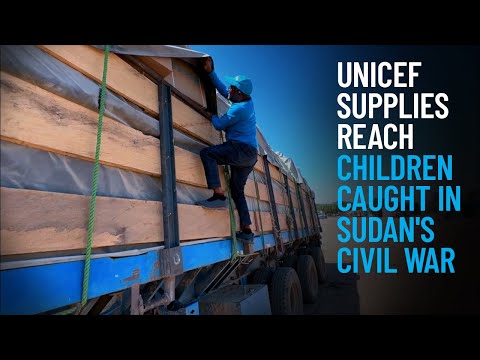More than half of Sudan’s population faces high levels of acute food insecurity
The conflict in Sudan is a children’s crisis: 13.6 million children urgently need humanitarian assistance; 10.8 million people, half of whom are children, have fled their homes in search of safety. Cut off from their livelihoods, facing continuous displacement, more than 24.6 million people across the country are now experiencing high levels of acute food insecurity.
By the end of 2024, famine conditions — already confirmed in Zamzam camp, North Darfur state — had spread to at least five more areas in North Darfur and the Western Nuba mountains as access to food and nutrition for millions of people continued to deteriorate. Immediate access and action are needed, UNICEF and the World Food Program warned on Dec. 24, to avert what could become the worst hunger crisis in recent history.
UNICEF is staying and delivering: a three-pronged approach
Despite challenges, UNICEF is staying and delivering through a three-pronged strategy: delivering critical supplies and services in conflict zones and hard-to-reach areas, providing urgent assistance to displaced and host communities in states receiving internally displaced persons and supporting the preservation of systems that deliver basic services across Sudan.
“In the past three months, UNICEF moved 60 trucks to Darfur to support over a quarter million children and families,” Fredrick Sheshe, UNICEF Sudan Chief of Supply and Logistics, reported from Adré, near Chad’s eastern border with Sudan. “With the continued dire situation in Sudan, UNICEF is scaling up the delivery of lifesaving supplies to the children and families in Darfur.”
VIDEO: UNICEF trucks bring essential supplies to children and families caught in a catastrophe
UNICEF-supported health volunteers screen children and pregnant women for malnutrition
In Kassala state, eastern Sudan, UNICEF-supported health volunteers go door-to-door screening children under 5 and pregnant women for malnutrition.The malnourished are referred immediately to the nearest heath facility for treatment.
The volunteers also provide children with vitamin A and deworming tablets; pregnant women receive iron tablets as well as health education to ensure their children are healthy, especially during the first 1,000 days of life. Proper nutrition during this period is critical for a child’s optimal cognitive and emotional development. Any deficiencies will impact a child for life, causing irreversible damage.
“Volunteers come to our homes to check on us and our children,” says Nafisa, holding her son Abdulgader on her lap in Aroma locality, Kassala state. ” My son was examined and given vitamins to maintain his health. I hope they will maintain these visits and come to us regularly to follow up on mothers and children.”

Ready-to-Use Therapeutic Food can restore a malnourished child to health in a matter of weeks
Health volunteers also visited Jamila’s house in Aroma locality to screen her daughter Amna for malnutrition. “They said she is suffering from malnutrition and told me to come here to see the doctor,” Jamila said, seated inside the health center. “The doctor examined her and confirmed. They have given her this food in the packet and she is eating well. I hope she recovers soon.”
UNICEF and partners rely on Ready-to-Use Therapeutic Food (RUTF) to treat children suffering from severe acute malnutrition. The nutrient-rich peanut paste is easy for parents and caregivers to use; it requires no refrigeration and no mixing with potentially contaminated water, and stays fresh for up to two years. One carton of RUTF contains 150 packets, enough for one six- to eight-week course of treatment to restore the health of a severely malnourished child.
UNICEF procures and distributes an estimated 75 to 80 percent of the world’s supply of RUTF.

Help UNICEF reach more children in need
Without immediate, unhindered humanitarian access and urgent international support, famine risks spreading further across Sudan in 2025, threatening the lives of millions of people, mainly children, and exacerbating what is already one of the world’s most severe food crises.
Help UNICEF scale up support for children. Donate today.
